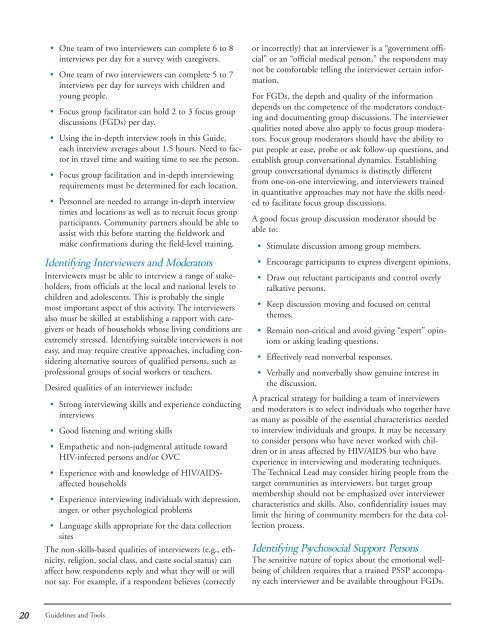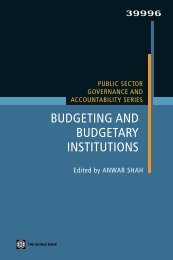Conducting a Participatory Situation Analysis of.pdf - Global HIV ...
Conducting a Participatory Situation Analysis of.pdf - Global HIV ...
Conducting a Participatory Situation Analysis of.pdf - Global HIV ...
Create successful ePaper yourself
Turn your PDF publications into a flip-book with our unique Google optimized e-Paper software.
• One team <strong>of</strong> two interviewers can complete 6 to 8<br />
interviews per day for a survey with caregivers.<br />
• One team <strong>of</strong> two interviewers can complete 5 to 7<br />
interviews per day for surveys with children and<br />
young people.<br />
• Focus group facilitator can hold 2 to 3 focus group<br />
discussions (FGDs) per day.<br />
• Using the in-depth interview tools in this Guide,<br />
each interview averages about 1.5 hours. Need to factor<br />
in travel time and waiting time to see the person.<br />
• Focus group facilitation and in-depth interviewing<br />
requirements must be determined for each location.<br />
• Personnel are needed to arrange in-depth interview<br />
times and locations as well as to recruit focus group<br />
participants. Community partners should be able to<br />
assist with this before starting the fieldwork and<br />
make confirmations during the field-level training.<br />
Identifying Interviewers and Moderators<br />
Interviewers must be able to interview a range <strong>of</strong> stakeholders,<br />
from <strong>of</strong>ficials at the local and national levels to<br />
children and adolescents. This is probably the single<br />
most important aspect <strong>of</strong> this activity. The interviewers<br />
also must be skilled at establishing a rapport with caregivers<br />
or heads <strong>of</strong> households whose living conditions are<br />
extremely stressed. Identifying suitable interviewers is not<br />
easy, and may require creative approaches, including considering<br />
alternative sources <strong>of</strong> qualified persons, such as<br />
pr<strong>of</strong>essional groups <strong>of</strong> social workers or teachers.<br />
Desired qualities <strong>of</strong> an interviewer include:<br />
• Strong interviewing skills and experience conducting<br />
interviews<br />
• Good listening and writing skills<br />
• Empathetic and non-judgmental attitude toward<br />
<strong>HIV</strong>-infected persons and/or OVC<br />
• Experience with and knowledge <strong>of</strong> <strong>HIV</strong>/AIDSaffected<br />
households<br />
• Experience interviewing individuals with depression,<br />
anger, or other psychological problems<br />
• Language skills appropriate for the data collection<br />
sites<br />
The non-skills-based qualities <strong>of</strong> interviewers (e.g., ethnicity,<br />
religion, social class, and caste social status) can<br />
affect how respondents reply and what they will or will<br />
not say. For example, if a respondent believes (correctly<br />
or incorrectly) that an interviewer is a “government <strong>of</strong>ficial”<br />
or an “<strong>of</strong>ficial medical person,” the respondent may<br />
not be comfortable telling the interviewer certain information.<br />
For FGDs, the depth and quality <strong>of</strong> the information<br />
depends on the competence <strong>of</strong> the moderators conducting<br />
and documenting group discussions. The interviewer<br />
qualities noted above also apply to focus group moderators.<br />
Focus group moderators should have the ability to<br />
put people at ease, probe or ask follow-up questions, and<br />
establish group conversational dynamics. Establishing<br />
group conversational dynamics is distinctly different<br />
from one-on-one interviewing, and interviewers trained<br />
in quantitative approaches may not have the skills needed<br />
to facilitate focus group discussions.<br />
A good focus group discussion moderator should be<br />
able to:<br />
• Stimulate discussion among group members.<br />
• Encourage participants to express divergent opinions.<br />
• Draw out reluctant participants and control overly<br />
talkative persons.<br />
• Keep discussion moving and focused on central<br />
themes.<br />
• Remain non-critical and avoid giving “expert” opinions<br />
or asking leading questions.<br />
• Effectively read nonverbal responses.<br />
• Verbally and nonverbally show genuine interest in<br />
the discussion.<br />
A practical strategy for building a team <strong>of</strong> interviewers<br />
and moderators is to select individuals who together have<br />
as many as possible <strong>of</strong> the essential characteristics needed<br />
to interview individuals and groups. It may be necessary<br />
to consider persons who have never worked with children<br />
or in areas affected by <strong>HIV</strong>/AIDS but who have<br />
experience in interviewing and moderating techniques.<br />
The Technical Lead may consider hiring people from the<br />
target communities as interviewers, but target group<br />
membership should not be emphasized over interviewer<br />
characteristics and skills. Also, confidentiality issues may<br />
limit the hiring <strong>of</strong> community members for the data collection<br />
process.<br />
Identifying Psychosocial Support Persons<br />
The sensitive nature <strong>of</strong> topics about the emotional wellbeing<br />
<strong>of</strong> children requires that a trained PSSP accompany<br />
each interviewer and be available throughout FGDs.<br />
20<br />
Guidelines and Tools















